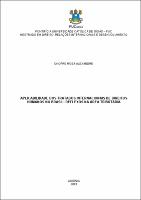| Compartilhamento |


|
Use este identificador para citar ou linkar para este item:
http://tede2.pucgoias.edu.br:8080/handle/tede/2676Registro completo de metadados
| Campo DC | Valor | Idioma |
|---|---|---|
| dc.creator | Alexandre, Onofre Rosa | - |
| dc.creator.Lattes | http://lattes.cnpq.br/9122564798909531 | por |
| dc.contributor.advisor1 | Silva, José Antonio Tietzmann e | - |
| dc.contributor.advisor1Lattes | http://lattes.cnpq.br/4585004100005242 | por |
| dc.date.accessioned | 2016-08-10T10:46:58Z | - |
| dc.date.available | 2014-04-14 | - |
| dc.date.issued | 2013-12-09 | - |
| dc.identifier.citation | ALEXANDRE, Onofre Rosa. APLICABILIDADE DOS TRATADOS INTERNACIONAIS DE DIREITOS HUMANOS NO BRASIL: REFLEXOS NA ÁREA TRIBUTÁRIA.. 2013. 176 f. Dissertação (Mestrado em Ciências Humanas) - Pontifícia Universidade Católica de Goiás, GOIÂNIA, 2013. | por |
| dc.identifier.uri | http://localhost:8080/tede/handle/tede/2676 | - |
| dc.description.resumo | Esta dissertação trata dos reflexos, na área tributária, da aplicabilidade no direito brasileiro dos tratados internacionais de direitos humanos. Tal aplicabilidade decorre da abertura da ordem jurídica nacional, pela Constituição de 1988, ao sistema internacional de proteção dos direitos humanos, possibilitando a incorporação daqueles tratados ao direito interno, como fonte normativa para a proteção dos referidos direitos. Quanto ao impacto jurídico de tais tratados no direito interno, apresenta-se, para as situações de conflitos normativos, a eficácia do método dialógico de solução de antinomias, norteado pelo princípio hermenêutico internacional pro homine. E em razão da superioridade hierárquica atribuída às normas internacionais de direitos humanos, demonstra-se que elas se afiguram como limites verticais materiais à produção normativa estatal, sendo possível o controle de convencionalidade da legislação doméstica em face de tais tratados internacionais. A partir das referidas constatações, estuda-se a aplicabilidade dos tratados internacionais de direitos humanos na área tributária, sendo examinadas específicas violações dos direitos humanos pelo atual modelo de tributação, em matérias relacionadas com as técnicas de concretização do princípio da capacidade contributiva; a não concessão de benefícios tributários por discriminação decorrente de posição econômica; o desrespeito ao direito de não-autoincriminação; o desrespeito ao princípio do non bis in idem. Conclui-se, ao final, que a aplicação dos tratados de direitos humanos à matéria tributária exsurge como fundamento imprescindível e inafastável a ser invocado, pelo contribuinte e pelo aplicador do direito, frente às violações de tais direitos pelo sistema de tributação vigente; além de contribuir para que o direito tributário se converta em instrumento minimizador das desigualdades sociais e propulsor do desenvolvimento dos povos. | por |
| dc.description.abstract | This dissertation deals with the reflections in the tax area, the applicability in Brazilian law of international human rights treaties. Such applicability stems from the opening of the national legal system, by Constitution of 1988, the international system of human rights protection, enabling the incorporation of those treaties into domestic law, as normative source for the protection of those rights. As regards the legal impact of such treaties in domestic law, presents to the situations of normative conflict, the effectiveness of the dialogical method of solution of antinomies, guided by hermeneutical principle international pro homine. And because of the hierarchical superiority attributed to international treaties of human rights, demonstrates that they appear as vertical limits to production materials normative state, and possible control of conventionality of domestic legislation in the face of such international treaties. From these findings, we study the applicability of international human rights treaties in tax being examined specific violations of human rights by the current taxation model in matters relating to the technical implementation of the principle of ability to pay, not granting tax benefits for discrimination arising from economic position; disrespect the right not to self-incrimination; disrespect to the principle of non bis in idem. It was concluded in the end that the application of the Human Rights Treaties to tax matters arises as indispensable foundation and essential to be invoked by the taxpayer and by applying the law, concerning the violations of such rights by the system of taxation in force, in addition to contribute to the tax law becomes an instrument for minimizing social inequalities and trigger development of peoples. | eng |
| dc.description.provenance | Made available in DSpace on 2016-08-10T10:46:58Z (GMT). No. of bitstreams: 1 ONOFRE ROSA ALEXANDRE.pdf: 1619480 bytes, checksum: 166fbc5bbbf54269fd55d6c5f00c4e63 (MD5) Previous issue date: 2013-12-09 | eng |
| dc.format | application/pdf | por |
| dc.thumbnail.url | http://localhost:8080/tede/retrieve/8851/ONOFRE%20ROSA%20ALEXANDRE.pdf.jpg | * |
| dc.language | por | por |
| dc.publisher | Pontifícia Universidade Católica de Goiás | por |
| dc.publisher.department | Ciências Humanas | por |
| dc.publisher.country | BR | por |
| dc.publisher.initials | PUC Goiás | por |
| dc.publisher.program | Direito, Relações Internacionais e Desenvolvimento | por |
| dc.rights | Acesso Aberto | por |
| dc.subject | Tratados Internacionais | por |
| dc.subject | Direitos Humanos | por |
| dc.subject | Tributação | por |
| dc.subject | International Treaties | eng |
| dc.subject | Human Rights | eng |
| dc.subject | Taxation | eng |
| dc.subject.cnpq | CNPQ::CIENCIAS SOCIAIS APLICADAS::DIREITO | por |
| dc.title | APLICABILIDADE DOS TRATADOS INTERNACIONAIS DE DIREITOS HUMANOS NO BRASIL: REFLEXOS NA ÁREA TRIBUTÁRIA. | por |
| dc.type | Dissertação | por |
| Aparece nas coleções: | Mestrado em Direito, Relações Internacionais e Desenvolvimento | |
Arquivos associados a este item:
| Arquivo | Descrição | Tamanho | Formato | |
|---|---|---|---|---|
| ONOFRE ROSA ALEXANDRE.pdf | 1,58 MB | Adobe PDF |  Baixar/Abrir Pré-Visualizar |
Os itens no repositório estão protegidos por copyright, com todos os direitos reservados, salvo quando é indicado o contrário.




